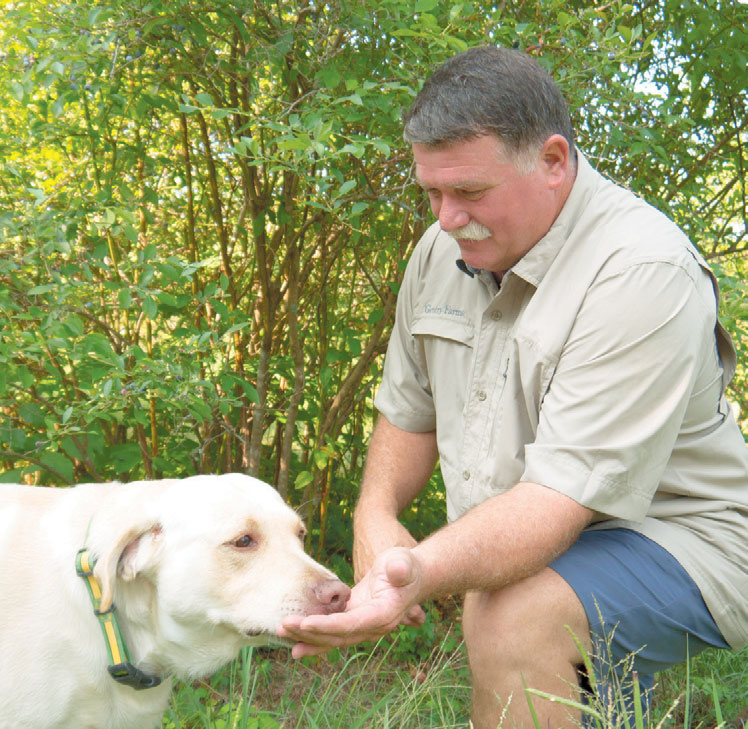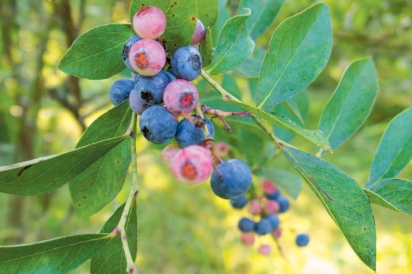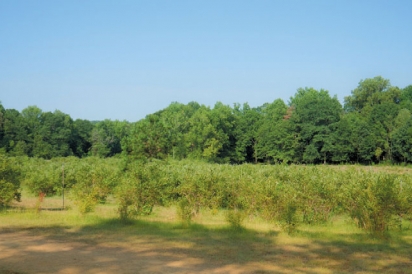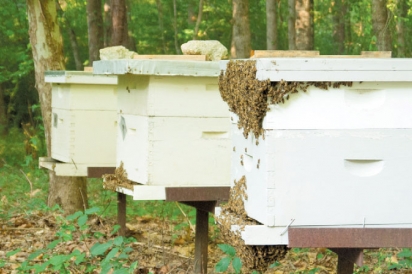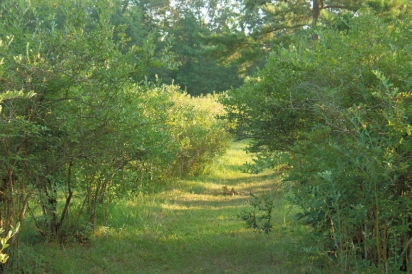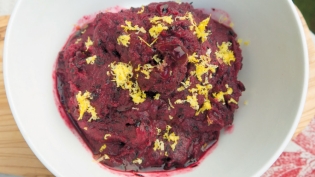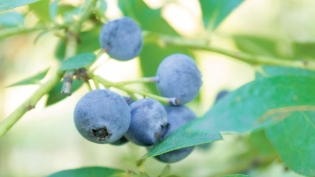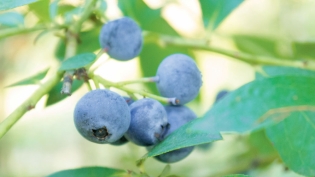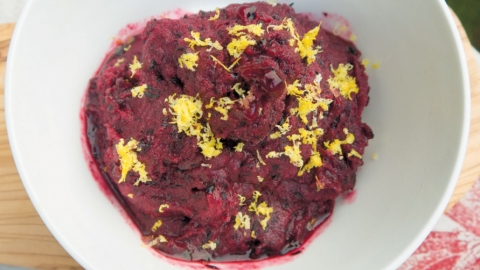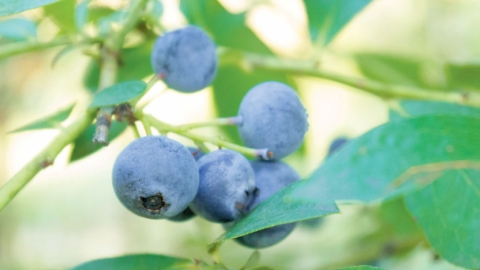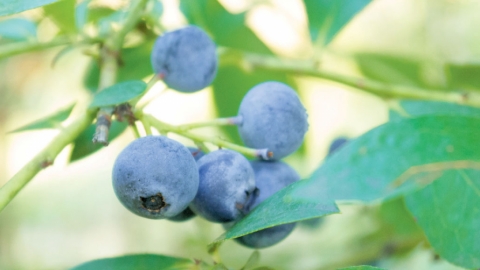The Accidental Blueberry Farmer
Nothing signals the arrival of summer more assuredly than ripe blueberries. We have seven of the perennial shrubs in our organic home landscape, and despite growing enough berries to freeze and eat throughout the fall, winter and spring, we still feel blueberry-insecure.
One can never have too many blueberry bushes planted in their yard, especially given the range of flavors, sizes and maturity times that different varieties offer. Within our own edible landscape, we have a smaller “Lemonade” variety that produces pink berries with a surprisingly lemonade-like flavor, ripening late June-July. On the larger end of the spectrum is an unknown variety that we simply call “Mom’s,” since it was dug from a massive blueberry colony in my mom’s garden in the Lowcountry; the large 6-foot tall bush produces huge numbers of candysweet, quarter-sized berries that are first to ripen starting in early June.
Long before commercial cultivation began, North America’s native blueberry varieties (in the Vaccinium genus) had a remarkably wide geographical distribution, ranging from eastern Canada to Alaska to Florida, and an equally diverse growth habit. On a childhood family vacation to the frigid tundra known as Nova Scotia, I still remember being shocked and delighted upon discovering a field of anklehigh lowbush blueberries, whose fruit was equally as flavorful as the tall highbush varieties I’d been acclimated to growing up in South Carolina.
Given this native species’ adaptability to virtually any growing zone in the United States, it should come as no surprise that the United States is the largest producer of blueberries in the world (56% of global production), with a whopping 6,700 pounds of blueberries produced per acre, on average. (Canada is a distant second at 30% of world blueberry production.) Since China produces nine times more apples than we do, perhaps the phrase “as American as apple pie” should be amended, especially considering that apples are native to central Asia, not the United States.
My and my wife’s esteem for blueberries is unparalleled, so we were thrilled when we were asked to visit and write about Mike Gault and Gentry Farms, an assignment which would require us to consume copious amounts of blueberries. The horror.
It was very late blueberry season when we made the drive out to Gray Court. When we arrived at Gentry Farm, Mr. Gault greeted us with every bit of jovial southern hospitality that one would expect from a southern good ol’ boy, and just in case his salutations were insufficient, Gentry, his pink-nosed white lab and Lilly Beth a “beagle mixed with something else” were on-hand to apply extra greetings, one lick at a time.
A small packing facility and covered seating area were the only structures visible amidst the acres of blueberry plants, which were surrounded by dense oak and pine forests. Apparently, during the height of blueberry season, the shaded seating area is “the place to be” for any of Gray Court’s old-timers interested in catching up on the latest happenings around town.
We were surprised to learn that Gault was an accidental farmer, who’d never intended to get into agriculture. Instead, he’d spent decades of his life running Gault’s Fountain & Service Center, a hub of commerce and social activity in Gray Court. When he purchased the property in 2009, he thought he was buying a forest. Unbeknownst to him, there was also an understory of blueberry plants, with muscadine vines and pecan trees throughout.
Go back three decades. Mr. Bill Gentry, the original owner of the land and the farm’s namesake, had been the proprietor of the local hardware store in Gray Court.
On his land, he’d decided to buck the typical agricultural approach of plowed soil with rows of annual corn or cotton, and instead planted perennial fruit and nut crops. He also used his knowledge from his hardware store business to install a well-fed irrigation system that was far ahead of its time.
Sadly, upon his passing, the property sat dormant and untended for over 7 years. As any biology student familiar with ecological succession might predict, larger trees and shrubs soon took their place amongst the fields of abandoned blueberries.
And this is when Gault, the accidental farmer, became the new steward of Gentry Farms.
Ironically, his lack of experience and knowledge would turn out to be an asset. Soon after discovering the hidden berry fields, Gault called out the area agricultural extension agents for advice, and was told that a regimen of insecticides, fungicides and herbicides was necessary if he wanted to farm blueberries there. “I figured if the plants had done just fine on their own for seven years, why on earth did I need to buy and apply a bunch of poison for them to keep growing,” he said.w
Seven years later, this decision has served him well. He has never used any of the “icides” that were recommended to him by the extension agents, a decision which became all the more personal to him after landing in the hospital due to a severe, life-threatening reaction to pesticides he unknowingly consumed on a friend’s garden okra. The only inputs he uses on his farm are yearly applications of fertilizer and regular irrigation during the growing season. (On our much smaller home-scale blueberry operation, we’ve found that wood chip mulch and actively aerated compost teas provide all of the biological fertility our plants require.)
Unfortunately, Gault’s more natural approach to blueberry farming is more the exception than the norm amongst blueberry growers in South Carolina, but the decision has paid off financially. Not only does he have to pay less to produce his berries due to fewer inputs, but his berries are highly sought after by the general public and chefs from Greenville’s top restaurants due to their exceptional flavor and lack of pesticides. (Six pickers during the summer help Gault keep up with demand.)
It was late July when we visited, and Gentry Farms’ fields were absent of the upickers (children and parents) that frequent the farm during the height of the season. However, there were still more than enough berries on his bushes for us to eat our fill of multiple varieties—and we can attest to the fact that we found them all delicious.
Gault drove us around his farm on his golf cart, showing us hidden blueberry fields in the back of the property where he also raises honeybees with the help of a local beekeeper. As it turns out, the farm’s history predated both Gault and his predecessor, Mr. Gentry. He showed us a family graveyard, long since overtaken by oak trees, that held the gravestone of Martin Dial, a Revolutionary War veteran born in 1723 and deceased in 1823. (Perhaps Mr. Dial’s secret to longevity was a daily ration of antioxidant and nutrient-rich blueberries.)
Gault’s accidental foray into agriculture has given him plenty of projects to focus on, now that he’s retired from his previous business. His high-energy, action-oriented personality juxtaposes interestingly against a farm whose 300-year history and decades-old perennial crops seem to cry out for its human inhabitants to slow down, listen and learn.
Gault has certainly listened to and learned from what the land has to teach, but we suspect he won’t be slowing down any time soon. There are too many people out there who want delicious, fresh, pesticide-free blueberries, and Mr. Gault is happy to accommodate them with the fruits of his efforts.
Gentry Farms
369 Dials Church Rd
Gray Court
864-230-3837


